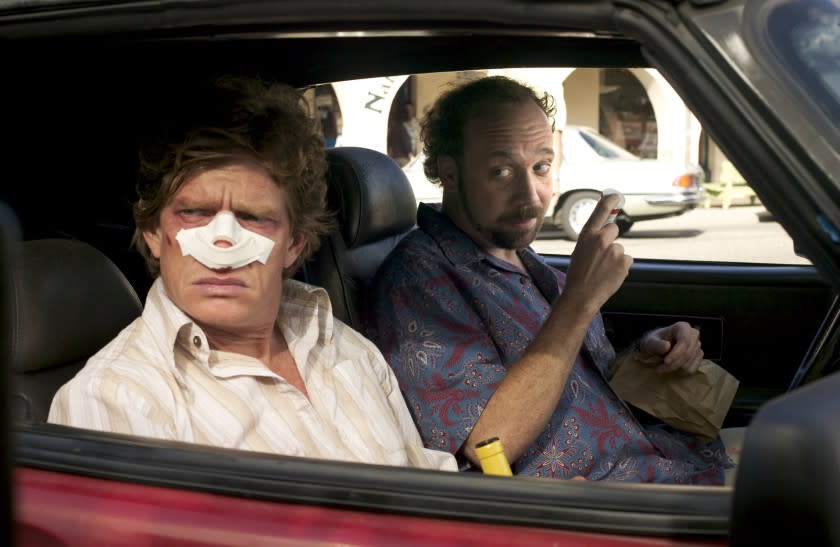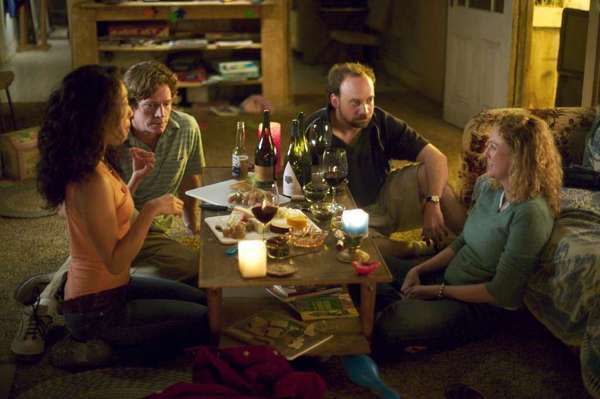Review: Aged to perfection, Alexander Payne's 'Sideways' is worth more than a glance

To be honest about Miles and Jack, something they never are about themselves, you'd have to admit they're morally sketchy characters. Feckless and self-absorbed, they're fraudulent even to their best friends, i.e. each other. Spending a week in their intimate company sounds like a chore, or worse.
It is the counterintuitive triumph of "Sideways," the wonderful new film by Alexander Payne, to turn seven days with these scoundrels into a completely satisfying movie that quietly, gently blows you away. Exactly written, directed with a surgeon's precision and transcendently acted, "Sideways" brings emotional reality to a consistently amusing character comedy, making it something to be cherished like the delicate Santa Ynez Valley wines that are the story's vivid backdrop.
Doing achingly true-to-life films about out-of-control situations ("Election," "About Schmidt") has become second nature to Payne and his longtime writing partner, Jim Taylor. Here they once again mix unmixables, combining humor, pathos and genuine feelings in a way that's warm, insightful and nonjudgmental.
But "Sideways," based on a novel by Rex Pickett, also takes this team's accomplishments to another level. After a raucous start with 1996's "Citizen Ruth," their films have gotten progressively more subtle, their comedy deeper, their themes more adult. With "Sideways," their first grown-up relationship movie, they have increased the maturity content and explored the notion of the value and difficulty of intimacy without losing any of the playfulness that has been their trademark.
In this examination of individuals who, better late than never, arrive all unawares at turning points in their lives, the filmmakers have been helped beyond measure by their quartet of key cast members. While all four — Paul Giamatti and Thomas Haden Church as Miles and Jack, Virginia Madsen and Sandra Oh as Maya and Stephanie, the women who enter their lives — are actors with careers and reputations, none of them, and that includes "American Splendor" star Giamatti, has given the kind of rich, enduring performance they all do here.
"Sideways" opens with Miles, an eighth-grade English teacher and would-be novelist complete with worn corduroy jacket, doing what he does best: messing things up and avoiding the blame. Roused from bed because his battered red Saab convertible is blocking a driveway, he makes a frantic call to the person he's supposed to meet, apologizes for being already late, and then proceeds to dawdle like the King of Siam, royally taking his time and baldly lying that traffic held him up.
The person he's meeting is Jack, Miles' best friend and former college roommate. An actor reduced to Spray 'n Wash voice-overs after a career that peaked playing a dashing doctor on an afternoon soap, Jack is getting married in exactly one week. Miles, the future best man, is taking his pal on a trip to the area just north of Santa Barbara, intent on helping Jack spend his "last week of freedom" indulging in fine dining, great scenery, unforgettable golf. And wine. Lots and lots of wine.
For wine is Miles' consuming passion, the great enthusiasm of his life. Listening to him talk wine is an education in itself, and he caresses grapes on the vine as if they were his true best friends. The kind of connoisseur who means it when he says "if anyone orders merlot, we're leaving," Miles can make judgments like "quaffable but far from transcendent" sound perfectly reasonable. And here he is paired up with Jack, who has to be told not to chew gum while tasting and thinks nothing of opening a warm bottle of expensive champagne if he's in a celebratory mood.
As we discover on the drive, there is this opposites-attract, Mr. Inside/Mr. Outside quality to the Miles-Jack relationship that makes their friendship plausible. While pessimistic Miles holds back, reluctant, for instance, to even discuss his years-in-the-making 750-page manuscript that's slowly making the rounds in Manhattan, Jack tells everyone who'll listen that it's about to be published.

Miles, fighting divorce-induced depression and used to approaching things sideways rather than head on, is frustrated by but also envies Jack's wholehearted embracing of life. The actor, meanwhile, knows he could use some of his friend's gravitas. These are men who often know what is best for each other, never for themselves.
Inevitably, romantic complications insinuate themselves into this jaunt. Jack, always the creature of impulse, is immediately attracted to the vivacious Stephanie, a tart-tongued pourer at a tasting room. And Miles, with insistent prodding from Jack, realizes that Maya, a waitress he's thought of as only a pal, is more attractive and more potentially interested in him than he'd allowed himself to notice. With the players set and enough wine flowing to make everyone as close to merry as they ever get, the games are free to begin in earnest.
It's in its willingness to be insightful as well as evenhanded with its characters, to completely understand but never whitewash behavior, that "Sideways" is especially potent. The film reveals vulnerabilities, insecurities, not-so-occasional miscalculations, but it also makes us care about its people while recognizing that they, like the rest of us, are nothing if not flawed.
Grounded in this kind of reality, "Sideways" works beautifully on any number of levels, from the at-times bawdily comedic to the genuinely heartbreaking. Cinematographer Phedon Papamichael has given it a bright look, Rolfe Kent has provided an inviting jazz score, and even the smallest characters are expertly cast thanks to casting director John Jackson. But again and again it is the four leads whose performances make all the difference.
As the self-doubting Miles, a man for whom every night is the dark night of the soul, Giamatti makes the best use of his querulous persona, investing an unerring comic touch in a character who is genuinely anguished. When Miles says, in one of the film's best moments, that "only when someone has taken the time to truly understand its potential can Pinot be coaxed into its fullest expression," he's obviously talking about himself.
Haden Church, best known for his TV work ("Ned and Stacey," "Wings"), brings unexpected empathy and a gift for deadpan double takes and open-mouthed befuddlement to Jack, a bluff Lothario increasingly gone to seed. He is beautifully matched by Oh (Payne's wife), who brings a captivating mixture of sensuality and directness to the woman who's the focus of Jack's attention.
Though the women in "Sideways" are not given as much screen time as the men, they're written with equal skill and are essential to the film's success. This is especially true of Maya, a character who carries the burden of being its most humane voice. Madsen's ability to bring delicacy, sincerity and soulful strength to a caring, grounded individual gives the film an emotional integrity it would be immeasurably less effective without.
Madsen's performance, as it turned out, was of special interest for me. When the actress came to Hollywood some 20 years ago, I was assigned to interview her for a magazine profile, and I've never forgotten the purity of her youthful ardor to do significant work. Though her resume is extensive, she never seemed to quite get the opportunity to fulfill those early dreams. And now she has. In a town noticeably lacking in happy endings, it must be gratifying for her and for all the actors who come to Los Angeles hoping to find material as exceptional as this and a director who believes they have the ability to handle it. A film like "Sideways" is the fulfillment of many hopes and desires, an audience's not least of all.

